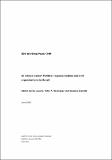In whose name? : political representation and civil organisations in Brazil

Download
Date
2005Author
Gurza Lavalle, Adrián
Houtzager, Peter P.
Castello, Graziela
Metadata
Show full item recordImpact
Abstract
There is now considerable evidence that civil organisations have become de facto and de jure representatives
of particular segments of the population and interests in the design, implementation, and monitoring of
public policy. This paper explores two questions that are becoming increasingly important in the debate
on the role of “civil society” in contemporary democracy: Who do civil organisations represent when they
act as representatives in the polity; and, in what terms is this representation constructed? The role of civil
organisations in political representation has received little or no attention in the research agendas on the
reconfiguration of representation or on the democratising of democracy. Furthermore, there are no wellestablished
theoretical models beyond the classic electoral or membership ones which set out how civil
organisations could establish their representativeness. The vast majority of civil organisations in middleand
low-income countries, however, are not membership based and few make use of electoral procedures
to authorise a mandate or establish accountability.
This paper examines which organisations define themselves as political representatives and the forms
of representation they are constructing. It also explores some of the possible consequences of different
forms of representation for democracy. The paper draws on findings of a survey of civil organisations –
that is, neighbourhood or community associations, membership organisations, NGOs, and coordinators
of networks of these organisations – in the city of São Paulo, Brazil. We find that organisations that
publicly claim to be representatives of particular publics in fact do engage in extensive representation
activities; and, that the dynamics of representation among civil organisations are closely related to those of
traditional political channels of representation. Furthermore, we find that the congruency arguments civil
organisations make publicly to support their representativeness are crystallising around a small number of
notions of representation. The most common are mediation, proximity, and services. The least common
are identity, electoral, and membership.
